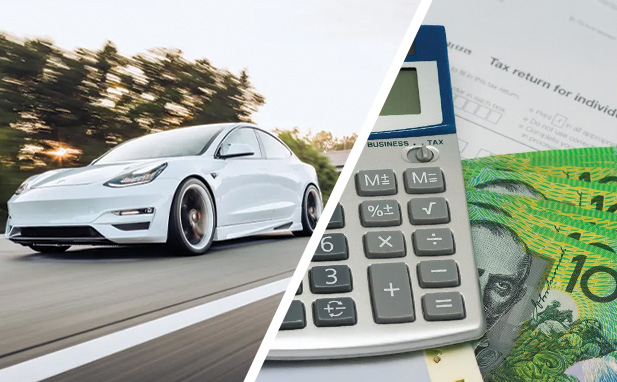In Australia, electric cars are fast becoming a part of daily life. However, a significant question is arising as more vehicles choose to plug in rather than fill up: who is liable for maintaining the roads without the existence of a fuel tax?
The government is considering implementing a distance-based road user charge, the EV road tax, to maintain sustainability and equity. Regardless of the vehicle’s fuel or energy source, this fee guarantees that each driver pays their fair portion of the road expenses.
This guide will explain the implications of Australia’s new EV road charge and what fleet owners, companies, and drivers can anticipate in the future.
Why a Road-User Charge Is Being Introduced
1. Replacing fuel excise revenue
Fuel excise — the tax built into petrol and diesel prices, has helped fund road construction and maintenance for decades. However, as more people buy EVs, fuel use decreases, which lowers revenue. The road-user tax seeks to bridge that disparity by requiring equal contributions from all cars.
2. Fairness among road users
Currently, drivers of petrol and diesel cars pay fuel tax every time they fill up, while EV drivers pay none. The new system makes contributions fair by basing charges on distance travelled rather than fuel consumed.
3. Supporting a sustainable system
Even as Australia transitions to zero-emission vehicles, there is still a reliable source of road maintenance funding based on distance.
Legal and Policy Background
The idea of a road-user charge isn’t new, but it’s been a legal challenge. In October 2023, the High Court ruled in Vanderstock v Victoria that Victoria’s state-based EV tax was invalid. Only the Commonwealth (federal government) can impose an excise.
As a result:
- States cannot create their own EV taxes unless coordinated with the Commonwealth.
- A national framework is now being discussed between state and federal treasurers.
- Any new law must be designed to avoid repeating the same constitutional issues.
The ruling pushed governments to create a unified national road charging scheme rather than individual state schemes.
How the EV Road Tax Will Work
1. Distance-based model
The EV road tax, also called the Road-User Charge (RUC), will be based on how far an EV travels each year. Instead of paying through fuel, drivers will contribute via a per-kilometre fee.
2. Planned start date
New South Wales (NSW) has set a start date of 1 July 2027, or earlier if EV sales reach 30%. Once a national model is established, other states will follow similar timelines.
3. Indicative rates
For the 2025–26 financial year, NSW has released indicative rates:
- 2.974 cents per kilometre for battery or hydrogen EVs
- 2.379 cents per kilometre for plug-in hybrid EVs (80% of the full rate)
Keeping up with inflation, rates will be indexed to the Consumer Price Index (CPI).
4. Fairness for plug-in hybrids
Plug-in hybrids still use fuel and therefore already contribute through the fuel excise. They’ll only pay 80% of the full rate to reflect this.
When the Charge Will Apply
Despite NSW’s roadmap, the national rollout depends on government coordination. Australia-wide options are being developed in a federal options paper.
For most drivers, this means no immediate impact in 2025, but likely changes within the next few years. It is expected to be introduced in mid-2027, unless adoption rates accelerate faster.
What This Means for You
For EV owners
- Expect a small additional cost each year based on your total kilometres driven.
- For example, if you travel 10,000 km annually, you might pay around $297 at current indicative rates.
- For accuracy, you’ll likely need to record odometer readings or report distances electronically.
For businesses and fleet owners
- The new tax will impact operating costs for EV fleets.
- You must include road-user charge expenses in cost planning and record-keeping systems.
- The good news: these costs will generally be tax-deductible for business use.
- Fleets may also offset these new costs through lower maintenance and fuel expenses typical of EVs.
For sole traders
- If you use your EV for business, a portion of the road-user charge may be deductible.
- Keeping clear mileage logs will be essential to claim these expenses accurately at tax time.
Key Benefits and Concerns
Benefits
- Fair contribution: Every driver pays based on use.
- Stable funding: Ensures ongoing investment in road infrastructure.
- Long-term sustainability: Supports Australia’s shift toward EVs without compromising road quality.
Concerns
- EV adoption: Some worry that adding a new cost could slow EV sales.
- Privacy: Some drivers may raise data concerns if distance tracking is electronic.
- Implementation complexity: A unified national model must work across all states and vehicle types.
The federal government has assured Australians that the charge will be introduced gradually and with public consultation to ensure it’s fair, simple, and transparent.
What Should You Do Now
- Stay informed – Keep up with government announcements as details become clearer.
- Track your mileage – Get into the habit now, so you’re ready when the new system starts.
- Plan your finances – Include potential RUC costs in your car ownership or business budgeting.
- Speak to a professional – A qualified tax accountant in Melbourne like Leading Tax Experts can help you prepare and plan for when this charge becomes law.
Our expert tax accountants can help you understand what this change means for your next tax return in Melbourne, fleet budgeting, and long-term financial planning.
Contact us to make your transition into the EV era smooth, compliant, and cost-effective.
Conclusion
In conclusion, Australia’s EV road tax marks a major shift in how we fund our transport infrastructure. It’s built on fairness, ensuring everyone contributes to the roads we all rely on, regardless of what powers our vehicles.
While final details are still being discussed, the message is clear: change is coming, and preparation now means fewer surprises later.
If you’re an EV owner, sole trader, or business operator, a trusted business accountant in Melbourne can help you plan your budgets, maintain compliance, and stay ready for the road ahead.
Frequently Asked Questions
When will Australia's EV road tax start?
The EV road-user charge will begin on 1 July 2027 or earlier if electric vehicles make up 30% of all new car sales. NSW has already confirmed this timeline; other states are expected to align once a national model is finalised.
How much will the EV road tax cost?
Based on current proposals, the rate will be 2.974 cents per kilometre for battery or hydrogen EVs and 2.379 cents per kilometre for plug-in hybrids. For example, driving 10,000 km a year would cost roughly $297 for an EV or $238 for a plug-in hybrid.
Will the new road tax affect EV incentives or benefits?
No immediate changes have been announced. The road-user charge is being introduced to make road funding fair, not to reduce existing EV incentives. Drivers can still benefit from lower running costs, federal FBT exemptions (for eligible EVs), and other state-based registration or stamp duty discounts.




